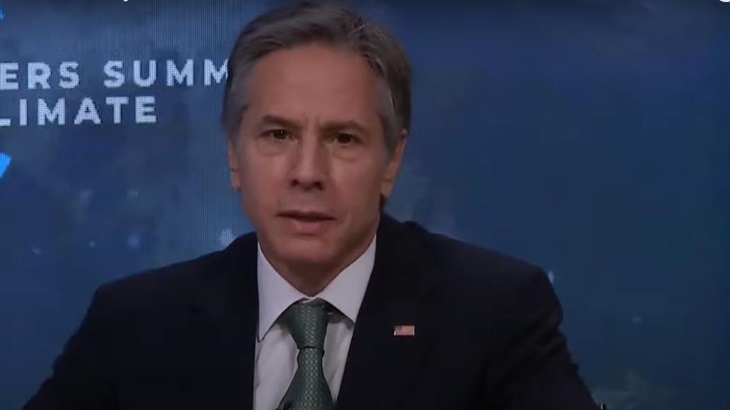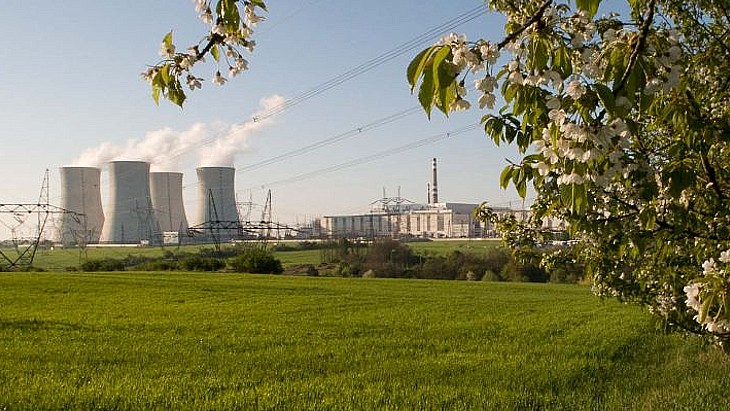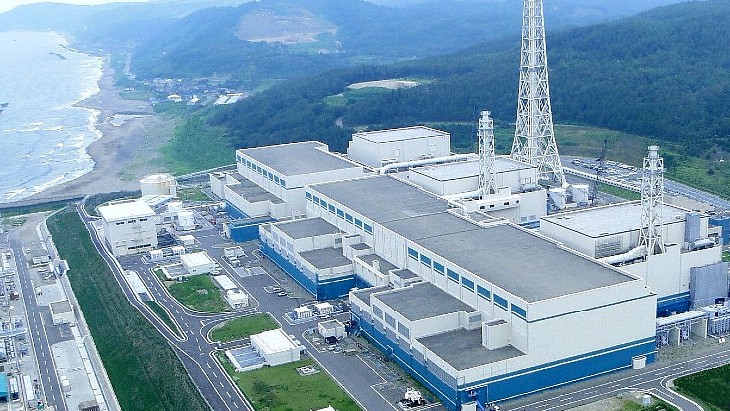Opening the session, which was titled Raising Our Climate Ambition, Blinken underlined the USA's new pledge, announced moments earlier by President Joe Biden, to halve its CO2 emissions from 2005 levels by the end of this decade. This is up from its original goal of 26% by 2025.
Nations under the Paris Agreement are set to unveil updated emissions targets for the next decade at the UN climate conference in Glasgow in November. The European Union and the UK had already announced their more ambitious targets, while Japan and Canada followed the USA in announcing their own during the summit.
"We're rooting for every country, every business, and every community around the world to succeed in this effort," Blinken said. "There are many issues on which we don’t all see eye to eye. This isn’t one of them. No matter what country we're from, we know the world that we want to pass on to our children and our grandchildren. I can think of no better or more urgent cause to bring us together."
Putin and Xi made similar remarks. The Russian president said: "Our discussion today demonstrates how deeply we all share the concern with regard to global climate change, and how much we are all interested in redoubling the international effort to address this issue," while Xi said: "I am confident that as long as we unite in our purposes and efforts, we will rise above the global climate and environment challenges and leave a clean and beautiful world for future generations."
Gigantic contribution
Putin said Russia's ecosystems make a "gigantic" contribution of absorbing about 2.5 billion tonnes of global CO2 emissions per year. The country's emissions have halved to 1.6 billion tonnes of CO2 on 1990 levels thanks to the restructuring of industry and energy that has been under way for decades, he said, adding that low-carbon energy sources, including nuclear power, currently account for about 45% of its energy mix.
Noting Russia's commitment to the "solid legal framework for international collaboration" provided by the UNFCCC, the Kyoto Protocol and the Paris Agreement, Putin said he was actively building national legislation. In his annual address to the Federal Assembly on 21 April, he said he had set the task of "significantly reducing" Russia's net accumulated emissions by 2050. "I'm confident that despite Russia's size, its geography, climate and economic structure that this task is achievable."
Putin invited countries to join "collaborative scientific research", adding, "I'm convinced that the fight for preserving our climate should certainly unite the efforts of the international community as a whole. Russia is willing to propose a whole range of joint projects and to consider potential benefits, even for foreign companies, that would like to invest in clean technologies."
Peak carbon
Xi re-affirmed China's commitment to peak emissions before 2030 and to be carbon neutral by 2060. China, the world’s biggest emitter of greenhouse gases, followed closely by the USA, is classed as a developing country under the Paris Agreement.
"Developed countries need to increase climate ambition and action and make efforts to help developing countries accelerate their transition to green and low-carbon development," Xi said. "The period between the carbon peak and the carbon neutrality, as promised by China, is far shorter than the time it takes for developed nations, and it requires China to make strenuous efforts."
China will "strictly limit" the increase in its coal consumption over the 14th Five-Year Plan period and phase it out in the 15th Five-Year Plan period, he added.
Make or break
Ahead of the summit, the European Union and the UK had set far-reaching targets.
Describing the current decade as "make or break" for the climate, European Commission President Ursula von der Leyen thanked Biden for convening the meeting on Earth Day.
"Eleven days after taking office, my Commission launched the European Green Deal for transforming our economy, and yesterday we agreed Europe's first-ever climate law with the European Parliament and our 27 governments. With this we write into stone the goal set out by the European Green Deal to make Europe climate neutral by 2050. We have also agreed to reduce greenhouse gas emissions by at least 55% by 2030.
"The Paris Agreement is humanity's life insurance and at the COP26 in Glasgow we must show that we have all understood this and that we are ready for more climate action because we are getting dangerously close to 1.5 degrees of global warming."
UK Prime Minister Boris Johnson thanked Biden for returning the USA to the "front rank" of the fight against climate change.
In June 2019, the UK became the first country to pass legislation for net zero by 2050. This week, the government announced it will enact a new climate change law targeting a 78% cut in greenhouse gas emissions by 2035 compared to 1990 levels.
"We’re actually speeding up because we see the obligations for developed countries to do more," Johnson told yesterday's summit. "As host of COP26, we want to see similar ambitions around the world and we’re working with everybody, from the smallest nations to the biggest emitters, to secure commitments that will keep change to within 1.5 degrees."
This means the richest nations "coming together" and exceeding the USD100 billion commitment they made in 2009. "Don’t forget that the UK has been able to cut our own CO2 emissions by about 42% on 1990 levels and we’ve seen our economy grow by 73%. You can do both at once."
Showing leadership
Japan's Prime Minister Yoshide Suga said his country was "ready to demonstrate its leadership" on the climate, announcing it would reduce its emissions by 46% in 2030 compared to 2013 levels. Previously, the world’s fifth largest emitter had pledged a 26% cut.
Soon after becoming prime minister in September last year, Suga pledged that Japan would aim to reach net-zero emissions by 2050. He told yesterday's summit that, to help achieve this, Japan aims to reduce its greenhouse gas emissions by 46% in fiscal year 2030, compared with the FY2013.
"By defining a top-level, ambitious target appropriate for the next growth strategy of the nation which underpins global manufacturing, Japan is ready to demonstrate its leadership for worldwide decarbonisation," he said. "From now on, we will accelerate our deliberations for establishing concrete measures towards achieving the target."
Last week, Suga and US President Biden launched the Japan-US Climate Partnership on Ambition, Decarbonisation and Clean Energy.
Phasing out coal
South Korean President Moon Jae-in also pledged a new target.
"The people of Korea, amongst the challenges of COVID-19 last year, set the goal of carbon neutrality by 2050 and are now working to put together detailed scenarios. Today, on behalf of the Korean people, I am deeply pleased to make two pledges for achieving carbon neutrality," he said.
The first is to raise its nationally determined contribution for 2030 and submit it to the United Nations this year. This will be up from the increase to 24.2% from the 2017 emissions level that it announced last year, he said. The second is to end all public financing for new overseas coal-fired power plants.
"Since the launch of my government, Korea has stopped issuing permits for building new domestic coal power plants, shut down 10 aged units ahead of schedule and, as a result, drastically reduced its reliance on coal-powered generation," he said. "To become carbon neutral, it is imperative for the world to scale down coal-fired power plants."
Sustainable lifestyle
Indian Prime Minister Narendra Modi didn’t provide a new emissions reduction target but re-confirmed the country’s goal to install 450 gigawatts of renewable energy by 2030. He also announced an India-US Climate and Clean Energy Agenda Partnership for 2030.
"Despite our development challenges, we have taken many bold steps on clean energy, energy efficiency, afforestation and biodiversity," he said.
India is the world’s third largest emitter behind China and the USA, but Modi stressed that his country's per capita emissions were 60% lower than the global average because the country's lifestyle is "still rooted in sustainable traditional practices".
"Sustainable lifestyles and a guiding philosophy of 'back to basics' must be an important pillar of our economic strategy for the post-COVID era," he said.
Protecting the Amazon
Brazilian President Jair Bolsonaro pledged carbon neutrality by 2050, a decade earlier than previously targeted, and vowed to end illegal deforestation by 2030, saying this would reduce the country’s greenhouse gas emissions by roughly 50% by that date.
Bolsonaro, who had previously threatened to withdraw from the Paris Agreement, has asked the USA to provide USD1 billion to pay for conservation efforts in the Amazon rainforest.
At the summit, he called for international support for Brazil's climate efforts. "With this spirit of collective responsibility and common destiny, I invite you once again to support us in this mission," he said.
50 billion trees
Saudi Arabia’s King Salman said boosting international cooperation is the "optimal solution" to tackling climate change because global warming ignores national borders.
"The objective is sustainable development, and in order to achieve this there must be a comprehensive methodology that takes into account the different developments and circumstances that exist around the world,” Salman said.
"During our G20 presidency last year we advocated the need to adopt a notion of a circular carbon economy, launching two international initiatives to curb land degradation and to protect coral reefs."
Crown Prince Mohammed bin Salman last month announced the Green Saudi Initiative and the Green Middle East Initiative that are designed to reduce carbon emissions in the region by 60%. This will be achieved mainly through the use of clean hydrocarbon technologies and the planting of 50 billion trees, including 10 billion in Saudi Arabia.
Price on carbon
Canadian Prime Minister Justin Trudeau vowed that Canada will cut its emissions by 40% to 45% by 2030 compared with 2005 levels. Thanks to "hard work and a solid plan", Canada is now on track to "blow past" its previous target of 30%, he said, noting that more than 80% of Canada's electricity is now emissions-free.
"If other major economies were to follow Canada's lead in putting a price on pollution - in 2030, Canada's carbon price will reach CDN170 per tonne - and commit to phasing out coal plants, we would accelerate our global path for a safe, prosperous, net-zero future," he said. "We are all facing different realities, but if all governments, indigenous people and sectors come together and work together, we should be able to find solutions and create real change."
Technology, not tax
Australian Prime Minister Scott Morrison pledged to improve the country's long-term targets before COP26. Australia is well on its way, he said, to "meet and beat" its commitments under the Paris Agreement, and has already achieved a 19% reduction on 2005 emission levels. It aims to achieve net zero "through the application of technology rather than taxes", he added.
The country is investing around AUD20 billion to achieve "ambitious goals" to bring the cost of clean hydrogen, green steel, energy storage and carbon capture to commercial parity and expects this to leverage more than AUD80 billion in investment in the coming decade. "Our ambition is to produce the cheapest green hydrogen in the world," he said, and this would transform its transport, mining and resource sectors, manufacturing, and fuel and energy production. Australia will work with other nations through technology partnership programmes, he said.
Common responsibilities
South Africa last year finalised its national climate change adaptation strategy and is updating its NDC under the Paris Agreement. This will bring forward by 10 years the point at which the nation's emissions will begin to decline, President Matamela Cyril Ramaphosa told the summit.
"Climate change is the most pressing issue of our time and a phenomenon to which developing economies, especially those in Africa, are particularly vulnerable. Without adaptation, climate change could potentially reverse developmental gains and push millions further into poverty and unemployment," he said, and called for aid on climate change to be separate from conventional development assistance.
"When it is given in the form of loan financing, the debt burden of developing countries is worsened. We call on developed economies - which historically bear the greatest responsibility for emissions - to meet their responsibilities to developing economies," he said.
Gaston Alfonso Browne, prime minister of Antigua and Barbuda, said his people are "teetering on the edge of despair". He asked the international community for debt relief and assistance to help his country recover from the effects of storms and the pandemic, "to prevent a flow of climate refugees".





_53514_33880.jpg)


_91467.jpg)





